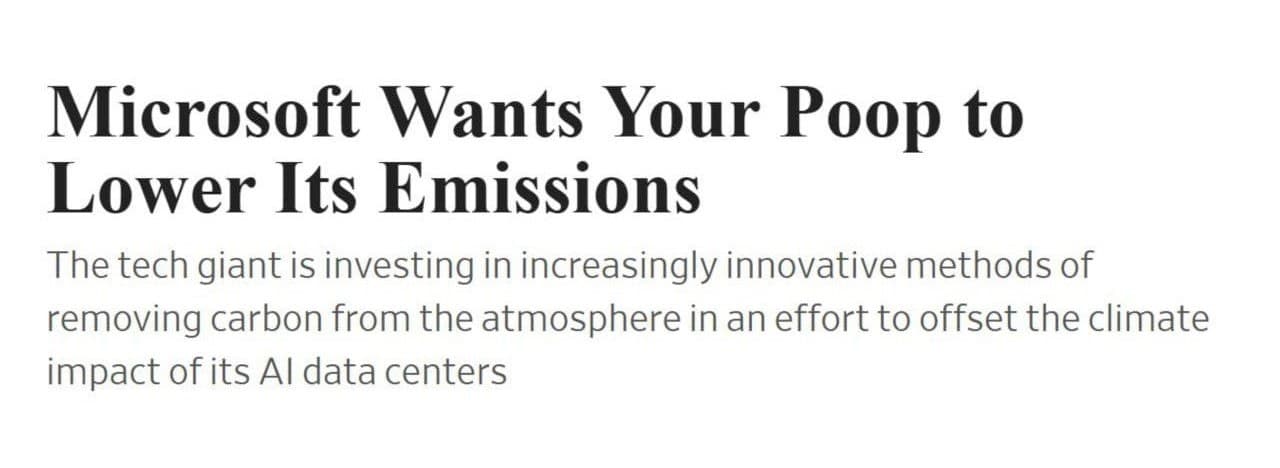Microsoft Signs 12-Year Contract to Dispose of Waste for Carbon Reduction
In a significant move to combat climate change, Microsoft has entered into a 12-year contract with Vaulted Deep, a company specializing in carbon sequestration, to dispose of approximately 4.9 million tons of dehydrated human feces and other organic waste. The initiative aims to reduce carbon emissions by pumping waste 1.5 kilometers underground, where it is expected to permanently isolate carbon dioxide (CO₂) and prevent harmful emissions from entering the atmosphere.
Contract Details and Goals
The agreement, announced earlier this week, reflects Microsoft"s broader commitment to environmental sustainability and carbon reduction. Brian Marrs, Microsoft"s senior director of energy and carbon removal, emphasized the necessity for innovative solutions in addressing climate change, stating, "The choice of this method is due to the fact that innovative solutions require significant investment at an early stage." This initiative aligns with Microsoft’s goal of becoming carbon negative by 2030, meaning the company plans to remove more carbon from the atmosphere than it emits.
This groundbreaking approach is part of a growing trend among large corporations seeking to implement sustainable practices in their operations. By utilizing advanced waste disposal techniques, Microsoft aims not only to reduce its carbon footprint but also to set an example for other companies in the tech sector and beyond.
Environmental Implications
The potential environmental benefits of this waste disposal method are substantial. According to experts, deep underground disposal can help sequester carbon effectively, thereby contributing to a reduction in greenhouse gas emissions. This method is seen as a proactive step towards mitigating climate change and promoting environmental health.
"The technology behind underground carbon sequestration has advanced significantly," said Dr. Emily Trent, an environmental scientist specializing in carbon reduction technologies. "If done correctly, this method could play a crucial role in our efforts to combat climate change."
Concerns and Criticism
However, the initiative is not without its critics. Environmentalists and waste management experts have raised concerns about the long-term effects of pumping waste underground, questioning the ecological safety and efficacy of the method. Some argue that the project could lead to unforeseen environmental consequences, including potential contamination of groundwater supplies.
"While the intention behind this initiative is commendable, we need to approach such projects with caution," said Laura Martinez, a spokesperson for the Green Earth Coalition. "The risks associated with underground waste disposal must be thoroughly evaluated before it is widely adopted as a carbon reduction strategy."
Additionally, some critics argue that the focus on such high-tech solutions may detract from the need for more direct measures, such as reducing overall waste production and improving recycling practices. They advocate for a more holistic approach to sustainability that includes not only waste disposal but also waste reduction and resource conservation.
Future Outlook
As Microsoft moves forward with this contract, the company plans to monitor the project closely and collaborate with Vaulted Deep to ensure that best practices are followed. The partnership will also involve ongoing research and development to optimize the waste disposal process and assess its long-term viability.
The implications of this initiative extend beyond Microsoft. If successful, the project could pave the way for other corporations to adopt similar waste management strategies, potentially leading to a significant shift in how businesses approach carbon emissions and environmental responsibility.
In conclusion, Microsoft"s contract with Vaulted Deep marks a notable step in the tech giant"s efforts to tackle climate change through innovative waste management solutions. While the project has garnered praise for its forward-thinking approach, it also faces scrutiny regarding its environmental implications. As the initiative unfolds, stakeholders will be watching closely to evaluate its effectiveness and impact on broader sustainability goals.
Next Steps
In the coming months, Microsoft and Vaulted Deep are expected to provide updates on the project"s progress, including findings from initial waste disposal operations. Stakeholders from environmental organizations, government agencies, and the business community will likely engage in discussions about the effectiveness and safety of underground waste disposal as a viable carbon reduction strategy.
Ultimately, the success or failure of this project could influence not only Microsoft"s future sustainability initiatives but also the strategies employed by other corporations as they seek to reduce their environmental impact.







![[Video] Gunfire between Iraqi security forces and Sadr militias in Baghdad](/_next/image?url=%2Fapi%2Fimage%2Fthumbnails%2Fthumbnail-1768343508874-4redb-thumbnail.jpg&w=3840&q=75)
